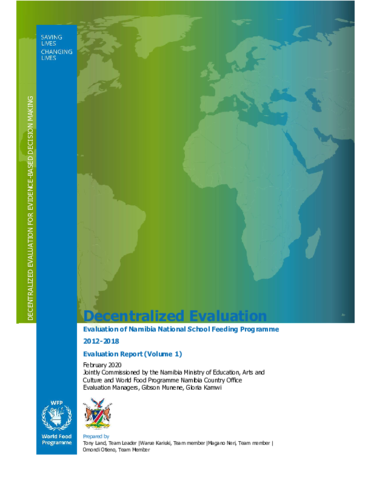
The purpose of the evaluation was to (1) Assess the extent to which the milestones outlined in the Road Map, Monitoring and Evaluation Plan (MEP) and WFP Technical Assistance (TA) agreements were achieved; and (2) Identify the reasons why results were, or were not achieved, in order to draw lessons, derive good practices for learning, and inform operational and strategic decision-making.
The evaluation was guided by evaluation questions distributed across considerations of relevance, effectiveness, efficiency, impact, sustainability, learning and benchmarking. Fieldwork took place between 9th September and 2nd October 2019.
Conclusions of the evaluation: NSFP has evolved from a pilot initiative into a nationally funded and executed programme operational in all districts. MoEAC as custodian of the programme has reached out to WFP for technical support and guidance to ensure application of good practices and improved results. Through this collaboration, a strong partnership has been forged. NSFP has contributed to relieving hunger and promoting access and retention. It remains relevant particularly in a period of recurring drought and economic downturn, responding to core Government of Namibia policy frameworks whilst providing relief to learners, carers and parents. However, the delivery system for the NSFP is operating sub-optimally, a situation that consequently undermines intended impacts. Where core systems underperform, achievements depend heavily on local leadership and commitment at the school level to innovate and seek coping strategies. While WFP TA support has helped MoEAC to address some of systemic challenges identified in 2012, a number of challenges persist, notably those related to staffing at national and regional levels, which impact on sustainability, quality assurance and efforts aimed at continuous improvement.
Some key recommendations from this evaluation: (i) Ensure that programme decision-making is guided by evidence and learning, (ii) To ensure learners receive a meal each and every school day, urgent action is required to resolve existing supply chain bottlenecks and optimise standard operating procedures; (iii) To assure the long-term sustainability of the NSFP, action is required to ensure that adequate human resources are mobilized, trained and retained at all levels; (iv) Explore and test out a new generation NSFP building on the strategic position of the NSFP within the school environment to fulfil its potential role as a vector for social transformation, gender equality and community resilience; (iv) Support the testing, adoption and implementation of Home-Grown School Feeding as envisioned in the National School Feeding Policy, and cognisant of MoEAC intentions to launch a set of HGSF pilots, actions should be taken to support learning and to accompany the scaling up process; (v) Commission a comparative analysis of alternative school feeding modalities to inform policy makers the costs and benefits of different modalities and (v) Given the overall positive contribution that WFP TA has made towards the NSFP, actions should be taken to ensure the continued relevance and effectiveness of external support going forward.
